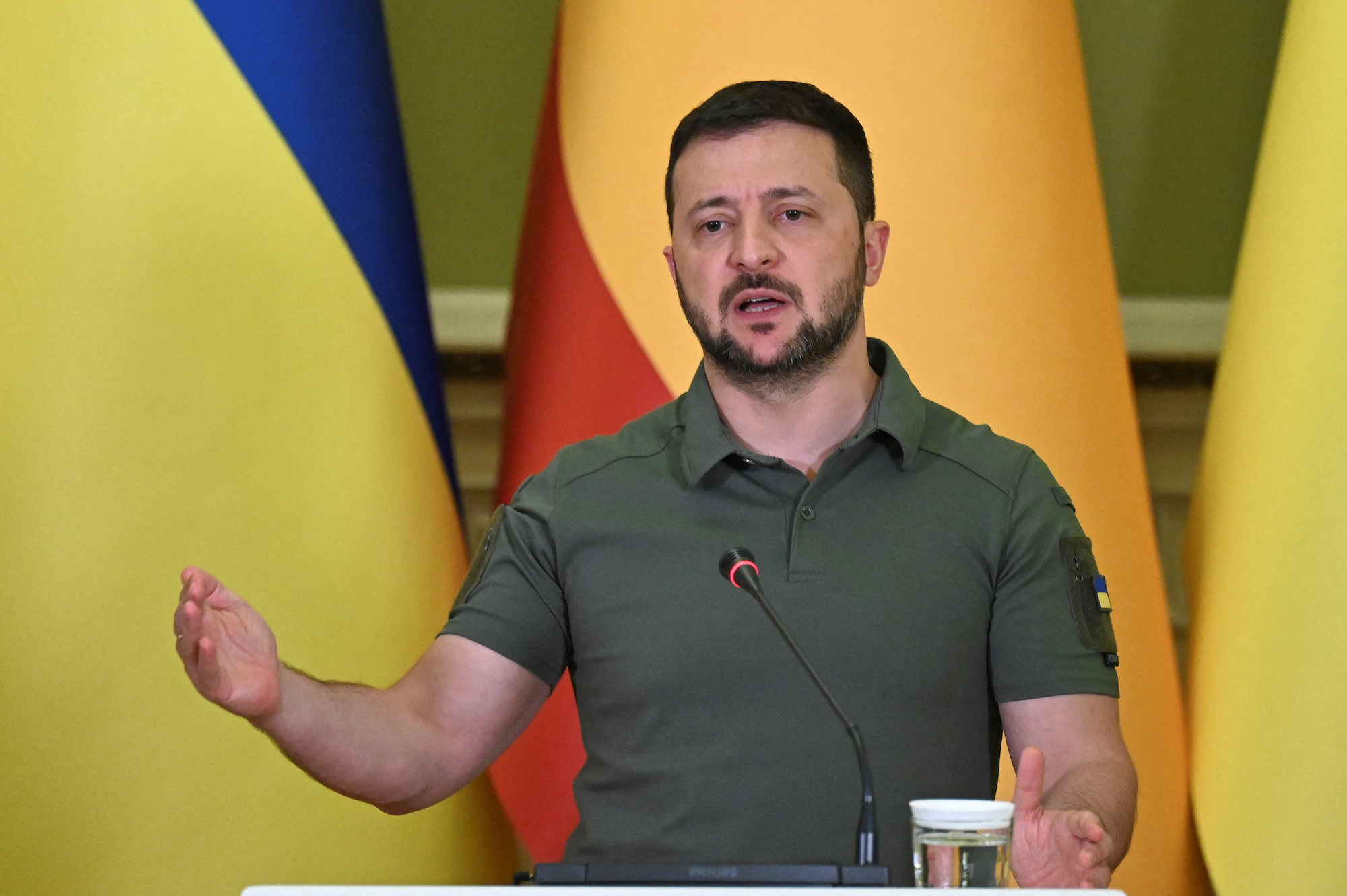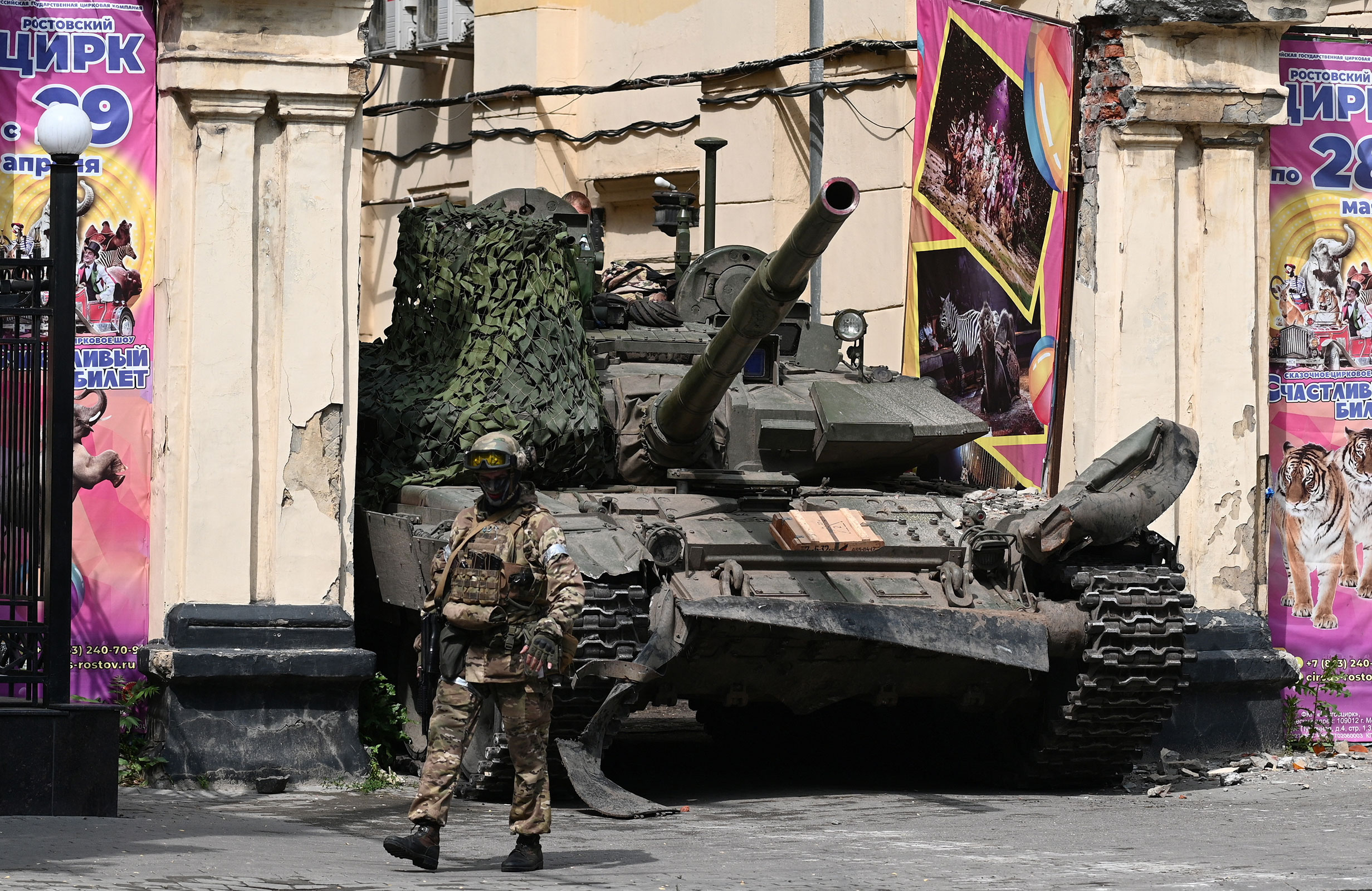
Ukrainian President Volodymyr Zelensky said he’s afraid to lose bipartisan support from the United States, following what he called “dangerous messages coming from some Republicans.”
“Mike Pence has visited us, and he supports Ukraine. First of all, as an American, and then as a Republican,” Zelensky said in a news conference with Spanish media in Kyiv on Saturday. “We have bipartisan support. However, there are different messages in their circles regarding support for Ukraine. There are messages coming from some Republicans, sometimes dangerous messages, that there may be less support.”
Zelensky said that regardless of who wins the next US Presidential election, maintaining bipartisan support is “the most important thing for Ukraine.”
During the same news conference, Zelensky was asked if he fears for his own life, to which he replied that he thinks “it is more dangerous for Putin” due to the Russian president’s growing number of international adversaries.
Some background: The topic of whether the US should continue aiding Ukraine against Russia’s invasion has created a rift among the Republican party.
GOP presidential candidates are split into two camps: Isolationists, particularly former President Donald Trump and Florida Gov. Ron DeSantis, who believe the US is too involved in supporting Ukraine’s efforts to fend off the Russian invasion; and hawks, including several former Trump administration officials, who argue for an even more aggressive posture toward Russia. Both sides are warning that if their positions aren’t heeded, a world war could follow.
US air defense units are being strained by global threats — including the war in Ukraine
The US Army’s air defense units are among the most overworked in the US military, manning missile systems across the globe to provide around-the-clock deterrence against adversaries including Russia, North Korea, China and Iran.
As demands stack up with the war in Ukraine and other looming concerns, US military leaders have warned that the country’s front line missile defense units could be stretched too thin.
A strain on personnel: The situation became so severe that in 2020, the service conducted a survey of air defense soldiers and families, and have recently been working to implement changes to offload some of the pressure those soldiers and their families are feeling.
The Army is offering $47,500 enlistment bonuses to attract more candidates for certain air defense jobs, including operating Patriot missile batteries, the advanced air defense system the US has provided to Ukraine.
It’s also embedded mental health specialists into air defense units around the world in an effort to address burnout.
The Army’s air defense branch is among the most frequently deployed branches of the service, with almost 60% of its total force deployed at any one time. On average, air defense soldiers were found to have less than a year at home after a year-long deployment.
Since Russia invaded Ukraine last year, US air defense soldiers stationed in Europe have had to deploy with just hours’ notice to protect NATO’s Eastern flank and assist in training Ukraine.
Meanwhile in the Pacific, the US military is increasing its presence in the region to prepare for a possible future conflict with China. All of this is in addition to an ongoing mission in the Middle East, though the Pentagon has reduced some commitments in the region.
“We have been overworked and undermanned,” one senior Army air defense officer told CNN. They spoke on condition of anonymity in order to speak freely.
An urgent training mission in Ukraine: The need for a strong air defense has been on display as Ukraine works to thwart relentless attacks by the Russian military. This weekend, Russian forces used Iranian-made drones in overnight strikes on Ukraine’s capital, but Kyiv’s air defenses destroyed all the drones, according to city leaders.
For the US soldiers tasked with providing defense for partners, as well as training Ukrainians to operate their own air defense systems, the stakes couldn’t be higher.
Master Sgt. Carlos Retana, a Patriot Master Gunner, led the US Patriot training for Ukrainians in Europe after they trained at Fort Sill, Oklahoma. The training was unlike anything he’d seen in his 23 years in the Army, Retana told CNN. Ukrainian troops ranged drastically in age and military experience, and very real consequences hung over the training as US troops sought to teach their Ukrainian counterparts everything they know.
Retana said ultimately, the US trainers were “praying that what we did was sufficient” before sending trainees back to the front lines.
Poland to step up security on Belarus border, minister says
From CNN’s Allegra Goodwin and Antonia Mortensen
Poland will send 500 police officers to bolster security along its border with Belarus, the Polish interior minister said Sunday.
“Due to the tense situation on the border with Belarus I have decided to bolster our forces with 500 Polish police officers from preventive and counter-terrorism units,” Mariusz Kamiński tweeted, adding the officers would join the border guards already guarding the frontier.
The announcement comes after the Polish Border Guard said 187 people had tried to illegally cross into Poland from Belarus on Saturday. The border guard also said a Ukrainian citizen was detained for helping five Ethiopians to cross.
The situation at the border has been tense in recent years as migrants hoping to travel deeper into Europe from Poland have attempted to cross, and has been complicated by the war in Ukraine.
A crisis erupted in late 2021 when thousands of migrants were stranded on the Belarus side of the Kuznica crossing for months in grueling conditions.
Some context: Belarus has been a close ally to Russia both before and since the invasion of Ukraine last year, and has agreed to Russia’s plans to station tactical nuclear weapons in the country. On Tuesday, Belarusian President Alexander Lukashenko said that most of them had arrived.
Belarus previously had no nuclear weapons since the early 1990s, when it it agreed to transfer them all to Russia after gaining independence following the collapse of the Soviet Union.7 hr 30 min ago
Zelensky says short-lived Wagner rebellion has diminished Russia’s strength on battlefield

Ukrainian President Volodymyr Zelensky said Wagner boss Yevgeny Prigozhin’s attempted rebellion in Russia last week “greatly affected Russian power on the battlefield” and could benefit Ukraine’s counteroffensive.
“They are losing the war. They have no more victories on the battlefield in Ukraine, and so they are starting to look for someone to blame,” he said at a news conference with Spanish media that took place in Kyiv on Saturday.
But Prigozhin’s rebellion could be beneficial in the early stages of Ukraine’s counteroffensive, he added.
We need to take advantage of this situation to push the enemy out of our land,” he said.
Zelensky said the counteroffensive will not be done quickly because he values human lives and is strategic in where troops are deployed.
“Every meter, every kilometer costs lives… You can do something really fast, but the field is mined to the ground,” he said. “People (are) our treasure. That’s why we are very careful.”
Zelensky also claimed 21,000 Wagner mercenaries have been killed in eastern Ukraine. He did not specify over what time period the supposed deaths took place.
“The most powerful group of Wagnerites was in eastern Ukraine,” Zelensky said.
“Our troops killed 21,000 Wagnerites in eastern Ukraine alone; 80,000 Wagnerites were wounded,” he added. “These were enormous losses for the Wagner PMC.”
Neither side releases battlefield casualty counts, and CNN cannot independently verify Zelensky’s claims. 8 hr 42 min ago
Russia is accused of committing “ecocide” in Ukraine. But what does that mean?
On June 6, Ukraine suffered an environmental catastrophe. The collapse of the Kakhovka dam in the south of the country sent water thundering downstream, killing more than 100 people according to Ukrainian officials. It wiped out villages, flooded farmland and nature reserves, and swept up pollutants like oil and agricultural chemicals as it made its destructive path towards the Black Sea.
The causes of the collapse have yet to be established – whether it was targeted as part of Russia’s war in Ukraine, or whether it was a structural failure – but what is certain is that it is one of the biggest ecological disasters Europe has seen in the last few decades.
And Ukraine is calling it “ecocide.”
Ukrainian President Volodymyr Zelensky described the collapse as “an environmental bomb of mass destruction.” High-profile figures outside the country have agreed. The Swedish climate activist Greta Thunberg, on a visit to Kyiv on Thursday, told reporters that “ecocide and environmental destruction is a form of warfare as Ukrainians by this point know all too well, and so does Russia.”
The term “ecocide” may be an unfamiliar one to many, but there has been a long-running fight to get large-scale environmental destruction recognized as an international crime, prosecutable at the International Criminal Court (ICC).
THEGUARDIAN






